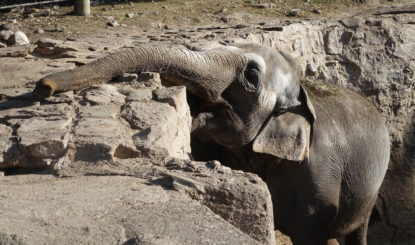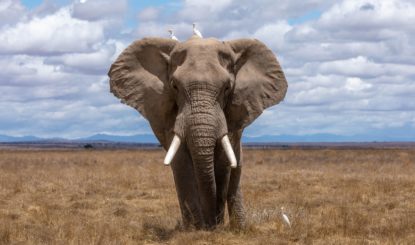Press release: Zurich Zoo wants everyone to believe that the death of an elephant calf was a natural occurrence – Fake news!
Last August, elephant Omysha gave birth to her first elephant calf at Zurich Zoo. Afterwards, the other elephants in the enclosure beat the newborn to death, which led to an internal investigation at the zoo. The outcome of the investigation was recently published: According to the zoo, it is perfectly “natural” for a herd of elephants to behave this way. This statement is false according to Fondation Franz Weber, based on the conclusions of an expert in elephant biology!
On 19 August 2020, Omysha, a female Asian elephant at Zurich Zoo, gave birth to her first elephant calf. The other elephants in the enclosure then kicked the newborn to death – resulting in an internal investigation at the zoo. Zurich Zoo recently published a press release (in German) to inform the public that this tragic incident was due to the “natural” behaviour of a non-aggressive herd of elephants in captivity, and that the adult elephants had simply attempted to “motivate” the elephant calf to stand up, because it was too weak to do so.
In reality, there was nothing “natural” about this incident. Quite the opposite. First of all, elephants do not display aggressive or violent behaviour towards elephant calves born in the wild. They would not trample on or repeatedly kick their young. However, in captivity, elephants develop inappropriate behaviour, sometimes aggressive, due to the conditions to which they are submitted, often throughout their entire lifetime. According to Dr Keith Lindsay, biologist and renowned international expert on the subject of elephants, in an article published on 7 November 2020, “In fact, everything about a zoo is unnatural for elephants”.
And worse still, according to Dr Lindsay, the female elephant that gave birth to the elephant calf was too young to conceive and experience childbirth. In fact, she was only six years old at the time of the birth, which means that she conceived the elephant calf two years previously when she was only four years old. In the wild, female elephants do not conceive their first calf until they reach eight or nine years of age, with the average age rather being around eleven or twelve. It is due to these circumstances that the elephant calf born in Zurich was actually weak.
In this respect, Dr Lindsay questions the management at the zoo, which he deems to be “irresponsible”. Apparently, the staff at the zoo had not noticed, through negligence, that the female elephant was of reproductive age, and so let her live near a young 14-year old male (also too young to breed). This “omission” on the part of the zoo might well not have been completely involuntary; too often zoos rely on births, particular those of large mammals, to sell entrance tickets. According to Dr Lindsay, “It is abundantly clear that the managers at Zurich Zoo have no understanding of basic elephant biology (…). In the interests of basic decency, they should immediately abandon their efforts to make elephants reproduce in captivity and, in the longer term, they should phase out their elephant exhibit entirely”.
Fondation Franz Weber (FFW) regrets this tragic incident, one that occurs too frequently in zoos in Switzerland and around the world. Elephants, like many other species, do not cope well living in captivity in zoos – the only place suitable for them is their natural habitat.
More Information:
- Our project page Elephants in zoos and circuses
- Our project page ZOOXXI – The future of zoos



